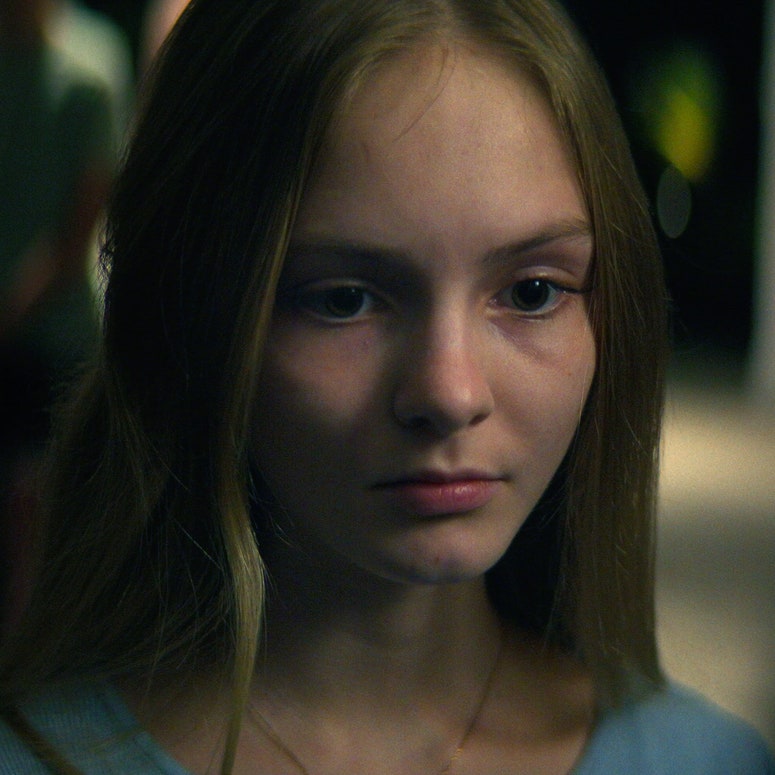This article references domestic and child abuse.
At 32 years old, Gypsy Rose is the closest she's ever been to living life on her own terms – one would hope. In late December, Gypsy (full name Gypsy Rose Blanchard-Anderson) was released from prison after serving seven years of a 10-year sentence for the second-degree murder of her abusive mother, Dee Dee Blanchard, in 2015. The internet's response has been mixed, to say the least.
As she embarks on a press tour to promote her new Lifetime docuseries, The Prison Confessions of Gypsy Rose Blanchard, Gypsy is also navigating a digital landscape that is borderline unrecognisable from when she was initially convicted back in 2016, complete with stan culture, memes and, err, yassfication, which all seem to be growing wildly out of control.
If you type ‘Gypsy Rose’ into TikTok, where she has 9.5 million followers, one of the first search suggestions is “Gypsy Rose cunty edit.” Over on X (formerly Twitter), where she has 7.8 million followers, many users post blithe tributes to Gypsy – “Gypsy Rose served for slaying mother” – while others have expressed concern over the media attention, with one user describing it as a “murderer to influencer pipeline.”
Gypsy reflected on the coverage during an interview with Good Morning America, noting, “Fame is not what I’m looking for […] Honestly, I’m a very shy person. I don’t think that I’m doing anything that anybody else wouldn’t do. I’m being myself.”
So, why does the world have such complicated feelings about Gypsy Rose?
Who is Gypsy Rose Blanchard?
Gypsy Rose was raised in Louisiana by a single mother, who was known to her family and friends as Dee Dee. When Gypsy was three months old, Dee Dee began taking her to the hospital, convinced that she was suffering from sleep apnea. According to Gypsy's father, Rod Blanchard, doctors could not find evidence of this.
As Buzzfeed reported in 2016, “Dee Dee always had a new idea about what was wrong with Gypsy.” She claimed that Gypsy suffered from seizures, which resulted in doctors prescribing her anti-seizure medication; she insisted her daughter had muscular dystrophy even though a muscle biopsy proved otherwise; and she shaved her head to mimic the appearance of a chemotherapy patient. Dee Dee forced her daughter to use a wheelchair and a feeding tube, as well as having Gypsy's salivary glands injected with Botox because she was ‘drooling too much’. As local media interest in their story grew, Dee Dee accepted donations from charities and her peers, including a house built from them in Missouri by Habitat for Humanity to accommodate Gypsy's access needs.
It later emerged that Gypsy was never disabled; she didn't require any of the medical interventions she received. Dee Dee had lied about Gypsy's health for her entire life. Experts believe that Dee Dee's behaviour stemmed from the mental disorder Munchausen syndrome by proxy, which is now generally referred to as factitious disorder or fabricated/induced illness imposed on another, which the NHS describes as when “a parent or carer exaggerates or deliberately causes symptoms of illness in the child.”
Gypsy's story hit the mainstream when Dee Dee's body was found in their house in 2015. She had been stabbed by Nicholas Godejohn, with whom Gypsy had met online and begun a relationship. Gypsy admitted to asking Godejohn to kill her mother and pleaded guilty to second-degree murder in 2016. She later said, “It was not because I hated her. It was because I wanted to escape her,” per ABC News.
In the 2018 Investigation Discovery documentary Gypsy’s Revenge, Gypsy said, “I couldn’t just jump out of the wheelchair because I was afraid and I didn’t know what my mother would do. I didn’t have anyone to trust.”
Gypsy Rose was sentenced to 10 years in prison, of which she served seven years before her early release in late December 2023. Her then-boyfriend Godejohn was found guilty of first-degree murder in 2018 and was sentenced to life in prison. He is not eligible for parole. In 2019, Godejohn reflected on his crime, saying, “I was blindly in love. That was always very much the case,” per The Springfield News-Leader.
Where do we go from here?
We are endlessly perplexed by survivors of abuse who… well, survive. The stories we tell ourselves about abuse invariably align with more stomachable outcomes than are found in reality. The heroic (and most enticing) version of the story concludes with the victim escaping their abuse, who is then caught – preferably alive – and punished accordingly. The victim evolves into a ‘survivor’ who spends the rest of their life advocating for those who have yet to escape.
The tragic (but no less palatable) version of the story ends with the victim's (and sometimes, the perpetrator's) death. In this version, the victim is never tainted by the inherent messiness of survival; in death, they are sanctified and absolved of all their human complexities. Likewise, should the perpetrator(s) survive, they will surely languish within a dehumanising criminal justice system that fosters degradation over meaningful rehabilitation.
These resolved endings put a stop to the conflict experienced by our protagonist (usually the victim), for better or worse. A neat resolution allows viewers to move on with their lives with the comforting knowledge that the story has ended; their services are no longer required.
But applying the logic of storytelling to real-life survivors of abuse, such as Gypsy Rose, was always going to be a useless endeavour. Case in point, during an interview with Lifetime, Gypsy and her husband Ryan Anderson, whom she married in 2022 while still in prison, were asked, “Which Disney character would Gypsy be?” Ryan wrote "Rapunzel from Tangled," while Gypsy wrote “Anna from Frozen.” Ryan's answer was roundly mocked for comparing Gypsy to Rapunzel in Tangled, who, reminder, is deceived and exploited by a woman claiming to be her mother.
But Gypsy Rose is not a Disney princess. Nor is she a character on a TV show, film, or podcast – despite the numerous adaptations completed or in the works. The only thing that anyone who doesn't personally know Gypsy can possibly discern is that she has endured a lifetime of incomparable abuse and has served a prison sentence for her role in the murder of her abuser. Unlike the protagonists of our favourite stories, we cannot simply close the book on Gypsy – nor can we police how she chooses to enjoy her newfound freedom. Her next chapter is just beginning.
If you are concerned about a child's welfare, you can receive help from the NSPCC and contact them on 0808 800 5000. If you are a child or young person concerned about your welfare, call Childline on 0800 1111.
For more information about emotional abuse and domestic abuse, you can call The Freephone National Domestic Abuse Helpline, run by Refuge, on 0808 2000 247.
For more from Glamour UK's Lucy Morgan, follow her on Instagram @lucyalexxandra.
“Abuse is a choice that the perpetrators make actively and alone.”


